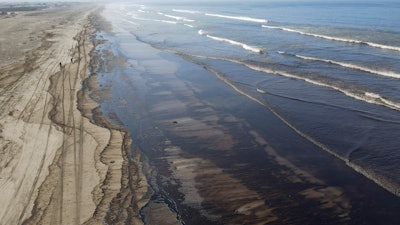
LIMA, Peru (AP) — An oil spill on the Peruvian coast caused by the waves from an eruption of an undersea volcano in the South Pacific nation of Tonga prompted dozens of fishermen to protest Tuesday outside the South American country’s main oil refinery.
The men gathered outside the refinery in the province of Callao near Lima’s capital. Peru's environment minister, Rubén Ramírez, told reporters that authorities estimate 6,000 barrels of oil were spilled in the area rich in marine biodiversity.
Under the eyes of police, the fishermen carried a large Peruvian flag, fishing nets and signs that read “no to ecological crime,” “economically affected families” and “Repsol killer of marine fauna,” which referred to the Spain-based company that manages La Pampilla refinery, which processes around 117,000 oil barrels a day, according its website. They demanded to speak with company representatives, but no executive had approached them.
The company did not immediately returned an email from The Associated Press seeking comment.
“There is a massacre of all the hydrobiological biodiversity,” said Roberto Espinoza, leader of the local fishermen. “In the midst of a pandemic, having the sea that feeds us, for not having a contingency plan, they have just destroyed a base of biodiversity.”
An Italian-flagged ship was loading oil into La Pampilla on Saturday when strong waves moved the boat and caused the spill. Repsol in a statement Sunday said the spill occurred “due to the violence of the waves.”
The eruption caused waves that crossed the Pacific. In Peru, two people drowned off a beach and there were reports of minor damage from New Zealand to Santa Cruz, California.
On Tuesday, northwest of the facility, on Cavero beach, the waves covered the sand with a shiny black liquid, along with small dead crustaceans. Fifty workers from companies that work for Repsol inside the refinery removed the oil-stained sand with shovels and piled it up on a small promontory.
Juan Carlos Riveros, biologist and scientific director in Peru of Oceana – an organization dedicated to protecting the world’s oceans – said that the species most affected by the spill include guano birds, seagulls, terns, tendrils, sea lions and dolphins.
“The spill also affects the main source of work for artisanal fishermen, since access to their traditional fishing areas is restricted or the target species become contaminated or die,” Riveros said. “In the short term, mistrust is generated about the quality and the consumption of fishing is discouraged, with which prices fall and income is reduced.”
Peru’s environmental assessment and enforcement agency estimates that some 18,000 square meters of beach on Peru’s Pacific coast have been affected by the spill.
In a statement, the Peruvian agency said Repsol “has not adopted immediate measures in order to prevent cumulative or more serious damage that affects the soil, water, flora, fauna and hydrobiological resources.” An AP reporter on Monday observed workers dressed in white suits collecting the spilled oil with plastic bottles cut in half.
José Llacuachaqui, another local fisherman leader, who was watching the cleanup, said the workers were only collecting the oil that reached the sand, but not the crude that was in the seawater.
“That is preying, killing, all the eggs, all the marine species,” he said.




















